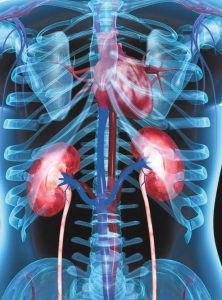By Dr. Aneley Yegezu Hundae, M.D., FACC
 Cardiorenal Syndrome: A Complex Interplay Between Heart and Kidneys
Cardiorenal Syndrome: A Complex Interplay Between Heart and Kidneys
The intricate relationship between the heart and kidneys often goes unnoticed until complications arise. Cardiorenal Syndrome, a condition where dysfunction in one organ triggers malfunctions in the other, exemplifies this interconnectedness. In this article, we delve into the mechanisms, types, and management of this bidirectional ailment.
Cardiorenal Syndrome represents a paradoxical challenge, where a sick heart can lead to kidney dysfunction, and vice versa. It encompasses a spectrum of disorders where heart and kidney conditions exacerbate each other, creating a cyclic deterioration that complicates treatment and management strategies.
This syndrome manifests through five distinct types, each showcasing a unique interplay between cardiac and renal functions. Type 1 involves acute cardiorenal syndrome, where abrupt heart injury leads to rapid kidney dysfunction. Type 2 showcases chronic abnormalities in heart function causing progressive kidney impairment. Type 3 occurs due to an abrupt deterioration in kidney function leading to heart failure. Type 4 refers to a chronic kidney disease causing heart dysfunction. Lastly, Type 5 involves systemic conditions affecting both organs simultaneously.
Understanding the pathophysiology behind Cardiorenal Syndrome is crucial. For instance, in Type 1, acute heart failure causes decreased blood flow to the kidneys, initiating a cascade of events leading to impaired renal function. Conversely, in Type 2, chronic heart failure leads to reduced cardiac output, activating neurohormonal pathways that adversely impact kidney function.
Managing Cardiorenal Syndrome demands a comprehensive approach. Treatment strategies often involve addressing the primary causative factor while simultaneously managing both heart and kidney conditions. Diuretics, ACE inhibitors, beta-blockers, and aldosterone antagonists are frequently employed to manage fluid overload and optimize cardiac function. However, cautious administration is essential to prevent further renal damage.
Lifestyle modifications such as dietary changes, exercise, and weight management play pivotal roles. Additionally, close monitoring of fluid intake and output, along with regular check-ups to assess cardiac and renal functions, are imperative in managing this complex syndrome.
Research continues to explore innovative therapies, including novel drugs targeting specific pathways involved in the cardiorenal connection. Furthermore, advancements in technology, such as wearable devices and remote monitoring, offer promising avenues for better management and early intervention.
Prevention remains a cornerstone in addressing Cardiorenal Syndrome. Early detection and management of risk factors like hypertension, diabetes, and obesity can significantly reduce the incidence of this syndrome. Educating individuals about the intricate relationship between heart and kidney health empowers them to adopt healthier lifestyles and seek timely medical intervention.
In conclusion, Cardiorenal Syndrome epitomizes the intricate interdependence between the heart and kidneys. Recognizing its various types, understanding the underlying mechanisms, and adopting a multidisciplinary approach to management are pivotal in mitigating its impact. Through ongoing research, innovative therapies, and proactive prevention strategies, we strive to alleviate the burden of this complex syndrome on global health.
Dr. Aneley Yegezu Hundae, M.D., FACC invasive cardiology and advanced heart failure management
Dr. Hundae received his Premedical and Doctor of Medicine Degree from Jimma University School of Medicine. He completed his Internal medicine Residency at Mercer University School of Medicine. His Heart Failure/Heart Transplant fellowship at the University of Miami Cardiovascular Fellowship Program. Cardiovascular fellowship at Baylor University Medical Center.
Board certifications
• Cardiology
• Advanced Heart Failure and Transplant
• Nuclear Cardiology
• Comprehensive Echocardiography
• Internal Medicine
3161 Harbor Blvd, Suite A, Port Charlotte, FL 33952
(941) 235-8892
www.portcharlottecardiology.com








